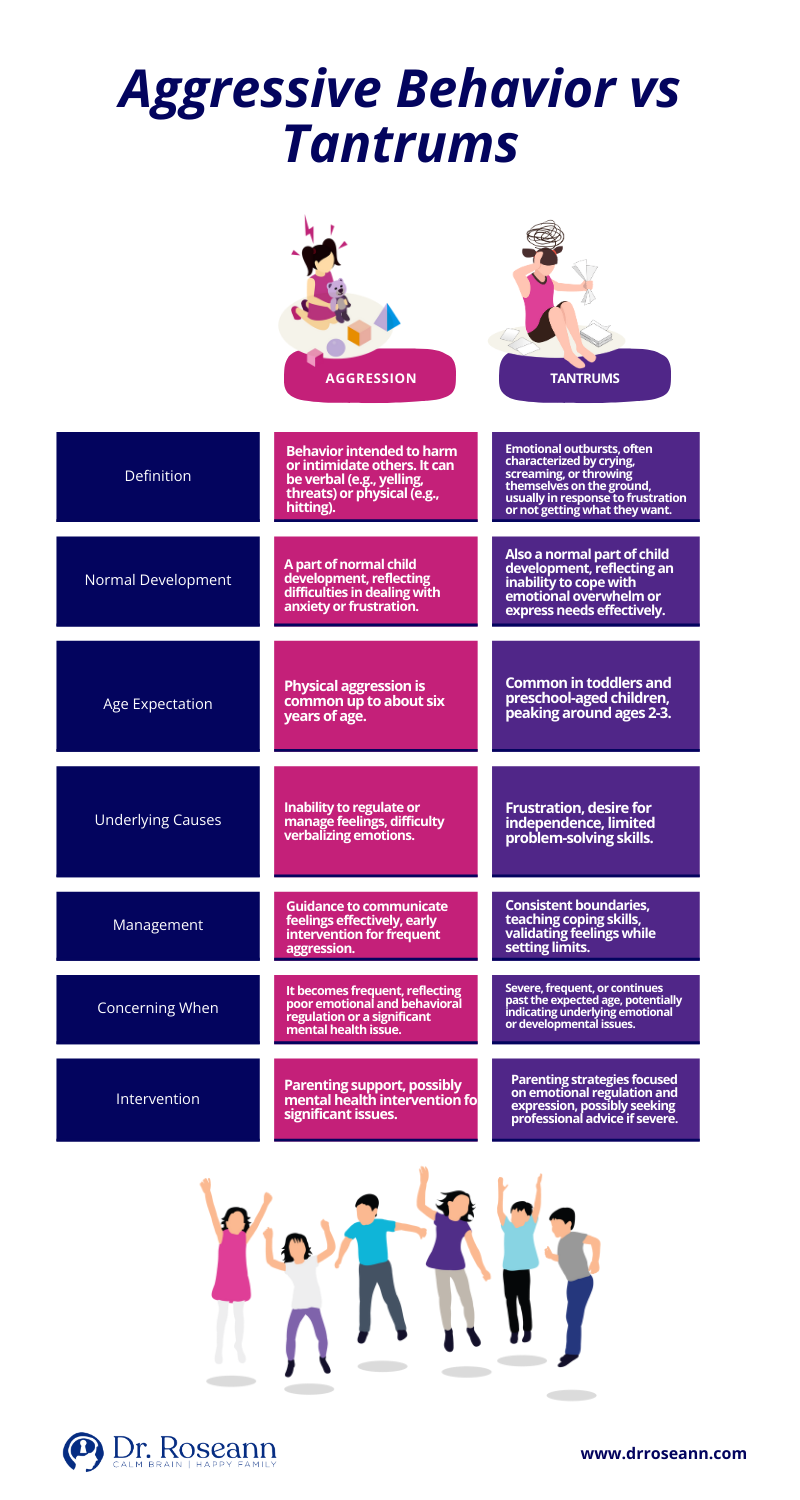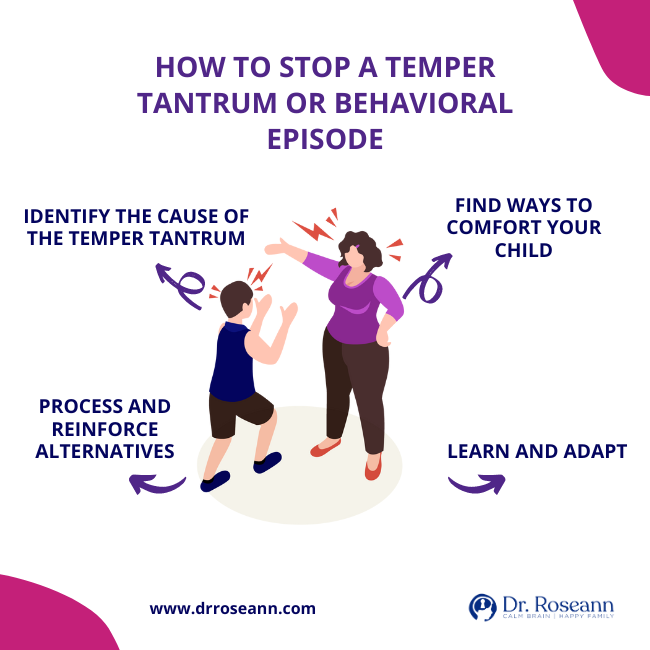Temper tantrums are a normal part of child development and raising children. But parents often struggle to manage them. All the parenting books and classes discuss the “terrible twos” and how to handle toddler tantrums, but as children approach five and six, a kid throwing tantrums may trigger parent concern.
These tantrums could differ depending on the child’s age, but temper tantrums in toddlers can be a huge concern because they usually resort to screaming, crying, and physical outbursts. It’s common to see a toddler throwing things or resorting to a stomping tantrum.
While parents become concerned that they reflect a more profound concern, they are a part of typical child development for most kids. There is no reason to jump to medication because good behavior can be learned. And no, you’re not a bad parent if your child throws a tantrum.
Tantrums, however, can be a sign of a problem that needs to be addressed when they occur with intensity, length, and frequency and occur outside the developmental window in older children.
Why Do Kids Throw Temper Tantrums?
One study found a link between toddlers' expressive language skills and the severity of their temper tantrums. Toddlers with fewer spoken words exhibited more frequent and dysregulated tantrums, suggesting a connection between language development and emotional regulation (Manning et al., 2019).
Temper tantrums are often an expression of frustration at the lack of control children have over their lives, and are more familiar with strong-willed children. Tantrums usually are triggered by hunger, exhaustion, discomfort, sensory needs, or wanting something they can't have. It can be a sign of a stressed child, too.
For example, a child may have toddler tantrums when they don't get what they want, such as a snack, a toy, or that red shirt at the store. They don't understand that you are in a rush and can’t stop to buy those things. As annoyed as you are about a screaming child in a public place and now being late, this is typical.
As much as tantrums are a normal part of a child's development, sometimes underlying clinical issues such as autism, Attention Deficit Hyperactivity Disorder, anxiety, OCD, and other issues are part of the problem.
Whatever the trigger, your child's healthcare provider will agree that children who have frequent emotional outbursts lack specific skills that would help your child better handle tantrums and situations that cause them to experience angry outbursts, frustration, or anxiety.
Problems with impulse control, problem-solving, delaying gratification, negotiating, communicating wishes and needs to adults, and knowing what's appropriate or expected in a given situation. Self-soothing is a skill that can be directly supported and learned once the brain is calm.
Some children have frequent temper tantrums, and others infrequently. It is common for a child to have as many as one or two a week.
Preventing Temper Tantrums in Toddlers and Kids of All Ages
Being proactive is vital in preventing childhood temper tantrums. Offering a child choice is very helpful in empowering a child to solve problems independently and promotes self-regulation. Once anxiety increases, problem-solving decreases. Teaching kids that they have options and control over their lives will help them today and in the future.
Following a schedule and letting your young child know the schedule and the expectations provides them with the structure they crave. Bring balance into your child's daily routine through good nutrition, following a sleep schedule, and practicing stress management daily (e.g., regular downtime, sensory activities, music, coloring, exercise, meditation, deep breathing, etc.) can go a long way in giving young children the tools they need to manage stress in their daily life.
When all else fails and temper tantrums happen, the best parenting tip is to stay calm when handling a meltdown. Communicate and support your child throughout the process. Children may learn to navigate strong emotions and errant behaviors with proper support and parental expectations.

Aggression vs Tantrums
Aggression is often a reflection of a child's difficulty dealing with their anxiety or frustration and an inability to verbalize their feelings as others do. However, aggression in and of itself is a normal part of child development.
A defiant child who engages in verbal aggression is a normal part of toddler development. Physical aggression can be expected in children up to about six. Most children outgrow these behaviors when guided to communicate better. What child hasn't hit their sibling or pushed a kid at the playground?
These kinds of behaviors are a reflection of their inability to regulate or manage their feelings at that moment. Like all less desirable behaviors, aggression is only an issue when it occurs frequently. A pattern of aggressive behavior reflects poor emotional and behavioral regulation.
This same pattern of aggression can also reflect a more significant mental health or behavioral issue. Addressing these behaviors early and getting parenting support can turn behaviors around.
How Long Should a Temper Tantrum Last?
A typical tantrum lasts a few minutes or less. Even a highly regulated child may have a tantrum here or there. Some children have tantrums for less than a minute a few times a week, and others have tantrums for 5 to 10 minutes a couple of times a month, but both are normal. Frequent temper tantrums lasting more than 25 to 30 minutes are atypical and associated with later behavioral issues.
A study by Deichmann and Ahnert (2021) involving 158 children from two-parent families investigated how children cope with frustration and how parents support them. Findings showed that children with high attachment security experienced frustration for shorter durations, and fathers tended to alleviate frustration more effectively than mothers.
Self-comforting behaviors reduced frustration by around 20%, while distraction and pretend-playing decreased it by 50% to 70%. Mothers tended to shield children from distress, while fathers aided them in coping; however, when mothers soothed, and fathers encouraged, children's frustration intensified.
Breath-holding Spells and How to Address Them
Breath-holding spells in children are involuntary episodes where a child briefly stops breathing, often triggered by emotions like frustration or pain. While frightening, these spells are typically harmless and tend to resolve independently.
To address them, it's essential to stay calm, ensure the child's safety during the episode, and comfort them afterward. Consulting with a healthcare professional can help rule out any underlying medical conditions and provide guidance on managing these spells effectively.

How to Stop a Temper Tantrum or Behavioral Episode
Identifying and proactively managing the tantrum triggers are the first steps to avoid tantrums. Supporting your child’s behavior is the best way to stop tantrums from ever happening. Knowing your child recognizes that they have specific behavioral and sensory triggers, you try to set up the environment or task in advance.
Identify the Cause of the Temper Tantrum
Identifying the real reason behind your child's behavior is critical in teaching them to communicate differently and self-regulate. Let your child know the schedule and behavior you expect in advance, and offer choices whenever possible.
I often recommend the use of social stories, which is a way to teach appropriate behaviors through the use of visual novels. So, for a child with transition difficulties, you would make a story that displays the problem, relevant solutions, and ways to communicate. Review it daily until the tantrum has subsided. The app Pictello is a beautiful tool for creating personalized social stories.
Find Ways to Comfort Your Child
You need a bag of tricks when you can't console your child, and they’re still having temper tantrums. Think about what works for your child: a hug, removing them from the situation, a weighted blanket, a parent leaving the room, turning on music, giving them a homeopathic, or whatever is your child's unique way to decompress and self-regulate.
If your child is prone to tantrums, ensure you always have access to your Natural Mood and Behavior Regulation tool kit. Mediate right away so as not to make the situation worse. Also, ensure that your child’s caregivers handle these situations well.
Process and Reinforce Alternatives
Not every kid is capable of communicating their distress. Parents can help process their child’s emotions after the tantrum by discussing what happened and reinforcing alternatives. Instead of shaming and blaming, parents should try positive parenting by focusing on communication skills and behavioral tools.
Typical kids learning how to manage emotions and behaviors need support, but young children with neurological issues may need even more patience and support. Remember, learning a new behavior takes some time, so be consistent and try to stay calm. Enjoy some time out with them. You’ll soon notice that they’ll have fewer tantrums as they learn to self-regulate.
Learn and Adapt
Addressing child behavior problems early is critical in helping children to self-regulate, which can have an immediate and lifelong positive impact on behavioral, social, and emotional regulation.
Good parenting isn't about how to stop tantrums through draconic child discipline methods like physical punishment. It's getting the parenting help that allows you to give your child positive attention and help them learn better skills.
Teaching them ways to cope and self-manage their stress early in life prevents later maladaptive habits that can be tough to break and interfere with cognitive, behavioral, emotional, and social functioning. Addressing issues also preserves or repairs self-esteem and reduces family stress. As a result, your child behaves so much better.
How Can Seeking Professional Support Help My Child's Tantrums?
At a minimum, kids who haven't outgrown temper tantrums have lagging skills in emotional regulation that warrant support. When strategies that worked for your other kids or advice from solid parenting books have yet to help, you must seek professional help.
A psychologist offers parenting advice that helps identify behavioral triggers and how to manage them. Addressing behaviors early is critical in assisting children to self-regulate, which can have an immediate and lifelong positive impact on behavioral, social, and emotional regulation.
Teaching them ways to cope and self-manage their stress early in life prevents later maladaptive habits that can be tough to break and interfere with cognitive, behavioral, emotional, and social functioning. Addressing issues also preserves or repairs self-esteem and reduces family stress.
The good news is that most children outgrow tantrums. When tantrums are challenging to manage, intense, or lengthy, seeking help may be necessary. In our BrainBehaviorReset™ Program, we work with families worldwide using a combination of neurofeedback and/or PEMF with counseling or parent coaching.
Coaching and counseling can be a valuable shortcut to give you the best parental attention and guidance to support your child's behavioral, social, and emotional needs. Addressing issues early without medication is critical to preventing habits that can interfere with your child's emotional well-being.
What is Parent-Child Interaction Therapy?
Parent Child Interaction Therapy (PCIT) is a structured therapy to improve parent-child relationships and address behavioral issues and conduct disorders in children aged 2 to 7, particularly kids temper tantrums. It involves teaching parents specific skills to enhance positive interactions with their children and manage challenging behaviors effectively through coaching, role-playing, and feedback.
Does the food that my child eats affect his tantrums?
Yes, the food your child eats can affect his tantrums. Foods high in sugar, artificial additives, or caffeine may contribute to mood swings and irritability. Also, make sure that your child gets enough rest to calm down.
What are learned behaviors in children?
Learned behaviors are actions or responses a child learns through experience rather than innate instinct. They are influenced by interactions with the environment, past experiences, and the consequences of those actions.
How do you distract your child from having a tantrum?
To distract your child from a tantrum, engage them in a different activity or have them take deep breaths. Try to offer them a child toy or their favorite blue shirt to focus on. Providing verbal reassurance or comfort may help redirect their attention. Staying calm is the key.
How can I avoid situations where my child can get a tantrum?
You can avoid tantrum-inducing situations by setting clear expectations, maintaining routines, and anticipating triggers such as hunger or fatigue. Remember that a tired hungry child is prone to tantrums. Provide choices within limits and offer distractions to help prevent tantrums from escalating.
What is the best way to handle tantrums?
The best way to handle tantrums is to stay calm, validate your child's feelings, and provide comfort while setting firm boundaries and redirecting their attention to a calming activity or distraction. It's vital to model patience and understanding and to avoid giving in to unreasonable demands during tantrum episodes.
Why is my child having more temper tantrums at home than at school?
School can increase anxiety, stress, and sensory issues in children. After holding it together all day at school, home becomes the safe place to vent their frustrations. Even kids with good self-regulation can get very overwhelmed by being at daycare or school.
What Can I Do When My Child's Temper Tantrum is Uncontrollable?
When a child is experiencing a tantrum or meltdown, they are unreachable and incapable of reasoning. Start by reducing whatever is causing the overload. That way, your child calms down faster. If there’s a safety issue, call a time out. Plan ahead and focus on calming strategies. Talking too much or yelling isn't going to help.
When Should I Worry When My Child's Tantrum Isn't Normal?
You should worry about your child's temper tantrums if they aren't expected, occur frequently with high intensity, are lengthy (more than 25 minutes), and if your child is self-injurious.
Tantrums frequently lasting long indicate a deeper issue and reflect a lack of self-regulation. Suppose your child can’t stay calm after a tantrum. That’s another red flag of a potential behavioral issue or lack of self-regulation.
Citations
Deichmann, F., & Ahnert, L. (2021). The terrible twos: How children cope with frustration and tantrums and the effect of maternal and paternal behaviors. Infancy, 26(3). https://doi.org/10.1111/infa.12389
Manning, B. L., Roberts, M. Y., Estabrook, R., Petitclerc, A., Burns, J. L., Briggs-Gowan, M., Wakschlag, L. S., & Norton, E. S. (2019). Relations between toddler expressive language and temper tantrums in a community sample. Journal of Applied Developmental Psychology, 65, 101070. https://doi.org/10.1016/j.appdev.2019.101070
Dr. Roseann is a mental health expert in Mood and Behavior who is frequently in the media:
- CityCURRENT Solutions for Your Kid’s Focus, Anxiety and Behavioral Issues with Dr. Roseann Capanna-Hodge.
- Epidemic Answers Neurofeedback for ADHD, Anxiety, OCD and Mood
- The Warrior Parent Podcast It's Gonna Be OK! Changing Behaviors and Responses (And The Magic of Magnesium)In Your Family with Dr. Roseann Capanna-Hodge
Always remember… “Calm Brain, Happy Family™”
Disclaimer: This article is not intended to give health advice and it is recommended to consult with a physician before beginning any new wellness regime. *The effectiveness of diagnosis and treatment vary by patient and condition. Dr. Roseann Capanna-Hodge, LLC does not guarantee certain results.
Are you looking for SOLUTIONS for your struggling child or teen?
Dr. Roseann and her team are all about science-backed solutions, so you are in the right place!
Grab your complimentary copy of
147 Therapist-Endorsed Self-Regulation Strategies for Children: A Practical Guide for Parents
Dr. Roseann is a Children’s Mental Health Expert and Licensed Therapist who has been featured in/on hundreds of media outlets including The Mel Robbins Show, CBS, NBC, PIX11 NYC, Today, FORBES, CNN, The New York Times, The Washington Post, Business Insider, Women’s Day, Healthline, CNET, Parade Magazine and PARENTS. FORBES called her, “A thought leader in children’s mental health.”

She coined the terms, “Re-entry panic syndrome” and “eco-anxiety” and is a frequent contributor to media on mental health.
Dr. Roseann Capanna-Hodge has three decades of experience in working with children, teens and their families with attention-deficit hyperactivity disorder (ADHD), autism, concussion, dyslexia and learning disability, anxiety, Obsessive Compulsive Disorder (OCD), depression and mood disorder, Lyme Disease, and PANS/PANDAS using science-backed natural mental health solutions such as supplements, magnesium, nutrition, QEEG Brain maps, neurofeedback, PEMF, psychotherapy and other non-medication approaches.
She is the author of three bestselling books, It’s Gonna Be OK!: Proven Ways to Improve Your Child's Mental Health, The Teletherapy Toolkit, and Brain Under Attack. Dr. Roseann is known for offering a message of hope through science-endorsed methods that promote a calm brain.
Her trademarked BrainBehaviorResetⓇ Program and It’s Gonna be OK!Ⓡ Podcast has been a cornerstone for thousands of parents facing mental health, behavioral or neurodevelopmental challenges.
She is the founder and director of The Global Institute of Children’s Mental Health, Neurotastic™Brain Formulas and Dr. Roseann Capanna-Hodge, LLC. Dr. Roseann is a Board Certified Neurofeedback (BCN) Practitioner, a Board Member of the Northeast Region Biofeedback Society (NRBS), Certified Integrative Mental Health Professional (CIMHP) and an Amen Clinic Certified Brain Health Coach. She is also a member of The International Lyme Disease and Associated Disease Society (ILADS), The American Psychological Association (APA), Anxiety and Depression Association of America (ADAA) National Association of School Psychologists (NASP), International OCD Foundation (IOCDF).
© Roseann-Capanna-Hodge, LLC 2024
Disclaimer: This article is not intended to give health advice and it is recommended to consult with a physician before beginning any new wellness regime. *The effectiveness of diagnosis and treatment vary by patient and condition. Dr. Roseann Capanna-Hodge, LLC does not guarantee certain results.










